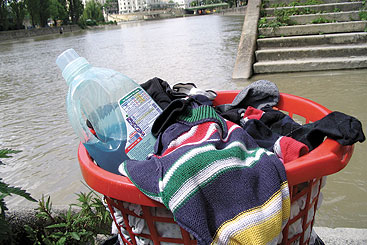
Cleaning up detergents in the basin
With EU legislation on phosphates in detergents still years away, the European Commission is recommending countries in the Danube Basin tackle bans at the national level.

Phosphates are commonly used in domestic and industrial detergents to soften water and make washing more effective. However they can also lead to excess nutrients in the river, reducing biodiversity through eutrophication.
The European Commission will propose restrictions on phosphate-containing detergents next year to combat eutrophication. In the meantime, however, the European Commission is encouraging Danube countries to put national efforts into place, reinforcing both the urgency and the need for action. “There won’t be EU legislation for some time”, says Philip Weller, ICPDR Secretary, “so the EU has said to the Danube countries: Go ahead and put into place national efforts.”
The European Commission’s report to Council and the European Parliament on detergents and the use of phosphates recommended that Danube countries “proceed with national legislation and/or further voluntary agreements to replace phosphate-based detergents to protect the Danube and Black Sea from eutrophication while awaiting the outcome of the Commission’s evaluation of the need for measures at the EU level.”
This decision was based on meetings between the ICPDR and representatives from the DG Environment and the DG Industry where the ICPDR was able to present the EU with information that clearly identified that the environmental consequences of excessive phosphates in the Danube River region were very severe, both for the Danube and for the Black Sea.
Danube countries leading the way. Within the Danube
Basin, Germany and the Czech Republic have adopted
legislation to ban phosphates in detergents, and
Austria has eliminated phosphates from detergents
through a voluntary agreement with industry. The
overall need now is to expand this to the rest of the
basin. The ICPDR Standing Working Group has recommended
that countries with the highest population
and high phosphate detergent use – Bulgaria, Croatia,
Hungary, Romania, Serbia and Slovakia – should initiate
a ban or a reduction of phosphates
together with industry.
ICPDR President Lucia Ana Varga has sent letters to Danube countries indicating the need to move ahead with these initiatives. “It is my belief that reduction of phosphates in detergents is needed across the Danube Basin”, says Varga. “As we have learned, the continued use of phosphates in detergents in the Danube River Basin could undermine the substantial investments in pollution control.”
Addressing the problem together. In October of this year, Romania will bring representatives of all Danube countries together with high level representatives from the business sector dealing with phosphates for a meeting in Bucharest to discuss a basin-wide action on phosphate reduction.
While any ban on phosphates in detergents must be initiated at the national level, the ICPDR will coordinate this action basin-wide; countries must work together on a regional basis to initiate national actions. “Under the frame of the ICPDR”, says Varga, “we can all benefit from the exchange of experience and coordinate the progress in reducing the nutrients and other pollutants.”
Disclaimer
The information contained in the ICPDR website is intended to enhance public access to information about the ICPDR and the Danube River. The information is correct to the best of the knowledge of the ICPDR Secretariat. If errors are brought to our attention we will try to correct them.
The ICPDR, expert group members, nor other parties involved in preparation of information contained on this website cannot, however, be held responsible for the correctness and validity of the data and information provided, nor accept responsibility or liability for damages or losses arising directly or indirectly from the use of the information conveyed therein.
Only those documents clearly marked ICPDR documents reflect the position of the ICPDR.
Any links to other websites are provided for your convenience only. The ICPDR does not accept any responsibility for the accuracy, availability, or appropriateness to the user's purposes, of any information or services on any other website.
When using the information and material provided on this website, credit should be given to the ICPDR.
